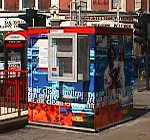Pollution Kills Thousands in the Capital
But local air quality monitoring stations have been removed
Air pollution in the capital may have contributed to the deaths of an estimated 3,000 people in one year and cost the NHS up to £20billion in air quality-related health issues, according to a report recently published by the London Assembly.
The Assembly Environment Committee report says London’s air quality is amongst the worst in the UK and Europe and well below targets set by the European Union. Emissions mainly from diesel vehicles contribute to a range of health problems, from coughing and sneezing to more serious illnesses requiring hospital admissions, and even death. Children and the elderly are worst affected, the report says.
All local authorities have a statutory duty to monitor air quality in their local area. Hammersmith and Fulham used to have two automatic monitoring sites in the borough, at Hammersmith Broadway and Brook Green, which operated 24-hours a day, collecting data for each 15-minute period. However, both were closed down in January 2009.
“The old stations were rather large walk-in units which were in difficult places on the pavement and due to highways work both had to be moved. While they are out of service, monitoring is still taking place,” a council spokesperson said.
No details were given on what the current monitoring provisions are. The Council say one new monitoring station is being planned and although no decision has yet been made on its location, Shepherd's Bush is said to be one of the places under consideration.
The Council's most recent Air Quality Progress Report was published in 2007. It shows targets were not being met: “Since the last report in 2006, the monitoring of nitrogen dioxide at the council’s automatic monitoring stations and passive diffusion tube sites has continued to indicate that exceedences of the annual mean target are occurring at the majority of sites. Although emissions are expected to fall in the future as improvements in vehicle engine and fuel technologies are adopted, exceedences are likely to continue and breach the 2010 objective unless additional actions are taken to reduce emissions further. The hourly mean target has been exceeded at Hammersmith Broadway for the last 4 years, and may also be breached at other very busy roadside sites.”
The EU is currently taking legal action against the UK for its continued failure to meet air quality targets and this could result in a hefty fine for the Government. Now Hammersmith and Fulham Council say they are concerned the Government could force the Mayor of London to reconsider his plans to scrap the western extension of the Congestion Charge zone in a bid to improve air quality in the capital.
Councillor Botterill, H&F Council Cabinet Member for Environment said: “We have not seen the double digit improvements to air quality that some people said the WEZ (western extension of the Congestion Charge zone) could bring. If the Government was serious about improving air quality they would scrap their plans for a third runway at Heathrow instead of imposing a road charging scheme that costs a fortune to run and does very little – if anything – to improve either air quality or congestion.”
The Department for Environment, Food and Rural Affairs confirmed that the Defra Secretary of State had powers over the Mayor on air quality but declined to comment on whether this was likely to affect WEZ plans.

The GLA report says road traffic remains the largest source of air pollution, and recommends the number of older, diesel buses should be reduced and the use of biofuel for all public transport should be looked into. The report also recommends the introduction of targeted low emission zones in central London and electronic information panels in public areas that show current pollution levels in order to keep residents informed. More should be done to encourage walking and cycling around the capital, the report says.
Simon Birkett of the Campaign for Clean Air in London says the United Kingdom tops the league for toxic traffic fumes in Europe, and air pollution near many of London's busiest roads averages well over twice the WHO's maximum recommended levels. “CCAL calls on Mayor Johnson to accept immediately the report including all its recommendations and the government, after some 10 years of static or worsening air pollution in London, to fund fully the main measures proposed. With thousands of lives seemingly lost prematurely every year in London, action must begin now not wait for 12 months to 18 months while the Mayor and the government dilly-dally over their air quality strategies and plans.
“To encourage such action, CCAL will be writing to the European Commission shortly urging it to escalate its legal action against the United Kingdom by issuing a final written warning for breaching standards designed to protect the public from dangerous airborne particles. Put in legislation in 1999, these laws have been broken every year since they entered into force in 2005,” he said.
7 May 2009
Related links
|
